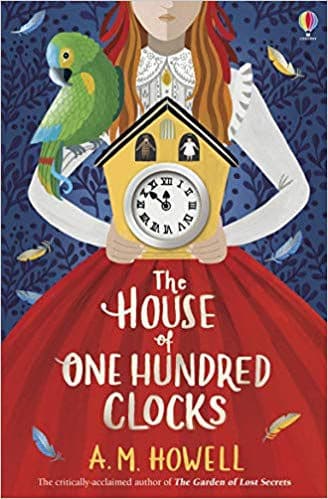
Book Title: The House of One Hundred Clocks (available here)
Author: A M Howell
Illustrator: Saara Katariina Soderlund
Publisher: Usborne
Publication Date: Feb 2020
Most Suitable For: Upper KS2
Suspenseful historical fiction set in the Edwardian period. Tightly woven around a central family mystery are eccentric characters with quirks aplenty and a plot brimming with darkness and intrigue.
Helena and her pet parrot, Orbit, move away from their family home in London to live in Cambridge, where her father has secured the role of clock-keeper in Mr Westcott’s house. There’s not just one timepiece to keep an eye on, though, or even a few – Mr Westcott’s house is filled with clocks in every room and he seems to believe that keeping the clocks ticking is the most important thing of all. If even one of the clocks were to stop, warns Mr Westcott, the consequences for everyone involved will be severe.
As Helena settles in, she begins to glimpse a deep strangeness around the house as a series of mysteries present themselves. As if the house wasn’t creepy enough with its never-ending cacophony of ticks and tocks, Helena soon notices a ghost-like figure watching her father wind the clocks and her curiosity reaches new heights. Before long, she finds herself deeply intrigued by the Westcott family’s mysterious past. It soon becomes clear that her family’s future is in danger and that unravelling the mysteries of the house before it’s too late is going to be a race against – well, time.
There’s plenty to unpack in A M Howell’s alluring narrative. The novel explores how different people respond to bereavement and the role of compassion in helping others through their grief. Themes of friendship, time, poverty and empathy ebb and flow through the plot, pulled together by sharp historical details that pave the way for the gender roles of the time to be examined with due nuance. Balancing the sadness of the themes of grief and loss is a thread of hope that picks up strength as the story progresses, especially in relation to the liberation of gender constraints – a hope that is personified in the characters who opt to compose themselves with integrity and forge their future path without compromising on either rights or morals.
I found this to be a clever and atmospheric story and, for me, it had added personal interest for two reasons – one in that the setting is my own hometown of beautiful Cambridge, and the other is that two of the siblings in the story share names with my own children!
———————
You can order The House of One Hundred Clocks online or from your local bookshop or library.
Many thanks to the publisher for sending us a review copy of this book.
Where next?
> Visit our Reading for Pleasure Hub
> Browse our Topic Booklists
> View our printable year group booklists.
> See our Books of the Month.









